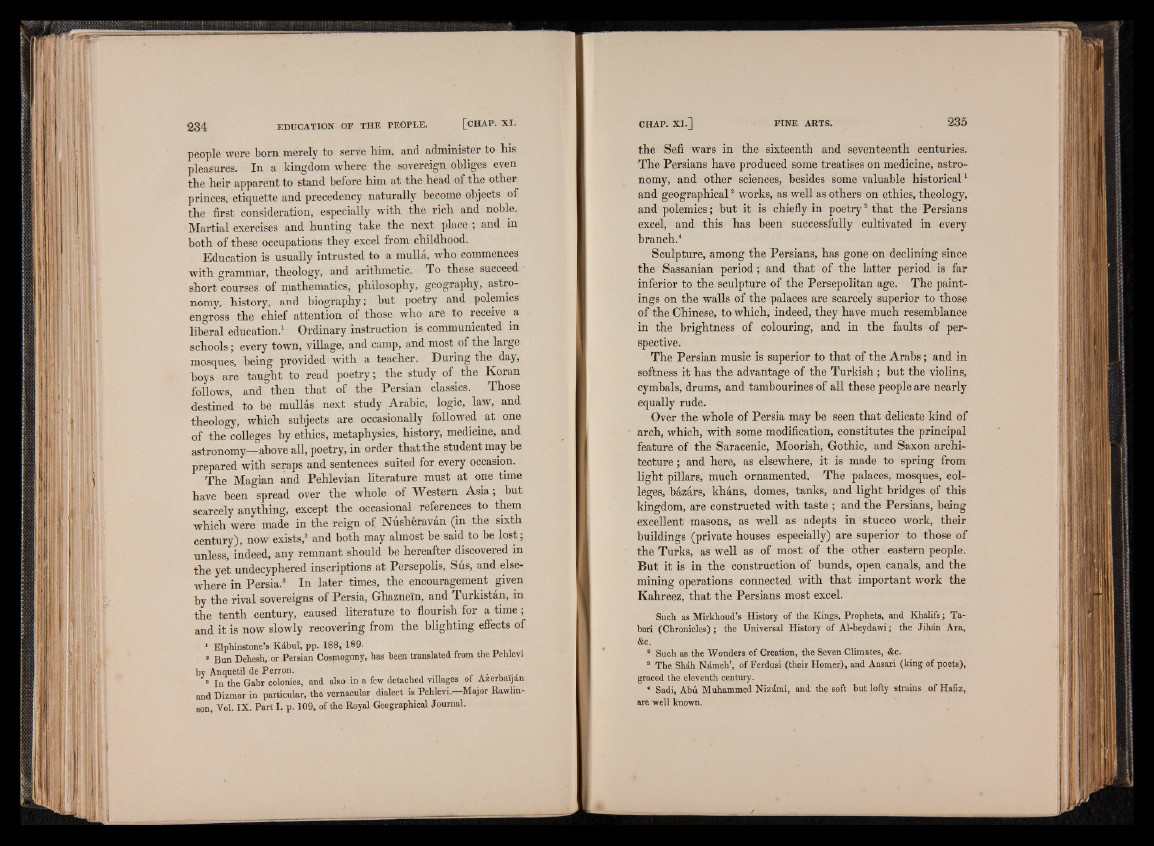
people were born merely to serve him, and administer to his
pleasures. In a kingdom where the sovereign obliges even
the heir apparent to stand before him at the head of the other
princes, etiquette and precedency naturally become objects of
the first consideration, especially with the rich and noble.
Martial exercises and hunting take the next place ; and in
both of these occupations they excel from childhood.
Education is usually intrusted to a mulla, who commences
with grammar, theology, and arithmetic. To these succeed
short courses of mathematics, philosophy, geography, astronomy,
history, and biography; but poetry and polemics
engross the chief attention of those who are to receive a
liberal education.1 Ordinary instruction is communicated in
schools; every town, village, and camp, and most of the large
mosques, being provided with a teacher. During the day,
boys are taught to read poetry; the study of the Koran
follows, and then that of the Persian classics. Those
destined to be mullas next study Arabic, logic, law, and
theology, which subjects are occasionally followed at one
of the colleges by ethics, metaphysics, history, medicine, and
astronomy—above all, poetry, in order that the student may be
prepared with scraps and sentences suited for every occasion.
The Magian and Pehlevian literature must at one time
have been spread over the whole of Western Asia; but
scarcely anything, except the occasional references to them
which were made in the reign of Nu slier av an (in the sixth
century), now exists,2 and both may almost be said to be lost;
unless, indeed, any remnant should be hereafter discovered in
the yet undecyphered inscriptions at Persepolis,. Sus, and elsewhere
in Persia.3 In later times, the encouragement given
by the rival sovereigns of Persia, Ghazne'in, and Turkistan, in
the tenth century, caused literature to flourish for a time;
and it is now slowly recovering from the blighting effects of
1 ElphiHstone’s KAbul', pp. 188, 189.
8 Bun Dehesh, or Persian Cosmogony, has been translated from the Pehlevi
by Anquetil de Perron. ■ .
8 In the Gabr colonies, and also in a few detached villages of Azerbaijan
and Dizmar in particular, the vernacular dialect is Pehlevi.—Major Rawlm-
son, Vol. IX. Part I. p. 109, of the Royal Geographical Journal.
the Sefi wars in the sixteenth and seventeenth centuries.
The Persians have produced some treatises on medicine, astronomy,
and other sciences, besides some valuable historical1
and geographical2 works, as well as others on ethics, theology,
and polemics; but it is chiefly in poetry3 that the Persians
excel, and this has been successfully cultivated in every
branch.4
Sculpture, among the Persians, has gone on declining since
the Sassanian period; and that of the latter period is far
inferior to the sculpture of the Persepolitan age. The paintings
on the walls of the palaces are scarcely superior to those
of the Chinese, to which, indeed, they have much resemblance
in the brightness of colouring, and in the faults of perspective.
The Persian music is superior to that of the Arabs; and in
softness it has the advantage of the Turkish; but the violins,
cymbals, drums, and tambourines of all these people are nearly
equally rude.
Over the whole of Persia may be seen that delicate kind of
arch, which, with some modification, constitutes the principal
feature of the Saracenic, Moorish, Gothic, and Saxon architecture
; and here, as elsewhere, it is made to spring from
light pillars, much ornamented. The palaces, mosques, colleges,
bazars, khans, domes, tanks, and light bridges of this
kingdom, are constructed with taste ; and the Persians, being
excellent masons, as well as adepts in stucco work, their
buildings (private houses especially) are superior to those of
the Turks, as well as of most of the other eastern people.
But it is in the construction of bunds, open canals, and the
mining operations connected with that important work the
Kahreez, that the Persians most excel.
Such as Mirkhoud’s History of the Kings, Prophets, and Khalifs; Tabari
(Chronicles); the Universal History of Al-beydawi; the Jihdn Ara,
&c. 8 Such as the Wonders of Creation, the Seven Climates, &c.
8 The Shih Ndmeh’, of Ferdusi (their Homer), and Ansari (king of poets),
graced the eleventh century.
4 Sadi, Abu Muhammed Nizdmi, and the soft hut lofty strains of Hafiz,
are well known.